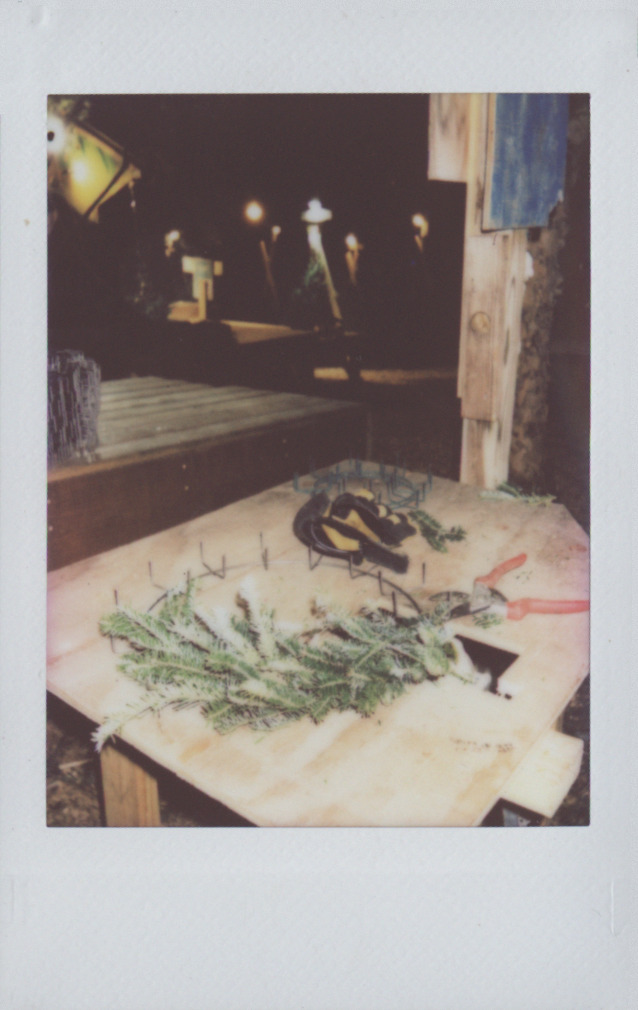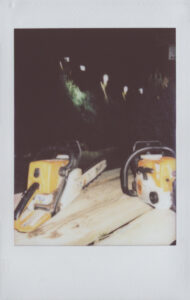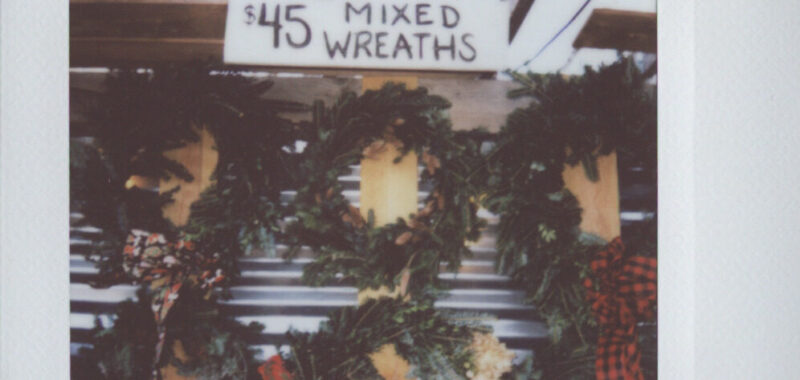
Friday, November 29, 2024
27 degrees
A twelve-hour opening shift and I dripped snot on the first customer’s debit card. But that’s Christmas tree season. Other than the barrel fire, there’s no place to get warm, so I wore fleece thermals with jeans on top, pockets full of pine needles already. Plus a hoodie and a blanket-lined denim trucker jacket that passes for hip. Ty doesn’t wear a coat, just three Carhartt hoodies on top of each other. Jack wears a knee-length puffer jacket from Goodwill. Brian wears a hoodie with the hood cinched tight around his face and his beard poking out. He looks the most like an elf. He also looks the most like Santa. Kids like to bring up one or the other. Sometimes we try to wear gloves, but they get caked in sap.
People are always asking why landscapers and construction workers are selling Christmas trees. The short answer is that trees are heavy and construction workers are strong, and that winter is cold and we’re mostly cool with that.
We’re set up across from a gay club in a rich part of Pittsburgh. Our boss started selling Christmas trees in this lot fifteen years ago. From that came a seasonal nursery selling flowers and shrubs in the summer, which led to a landscaping service, which became full-service contracting, which is why now you have a bunch of carpenters temporarily assigned to tree duty. We make good money in tips.
I work in the nursery during the warmer months and on jobsites when the plant business slows. Even I’m surprised that it’s here, just a rickety greenhouse and a few sheds dropped onto a sloping city lot in the neighborhood where the Mellons and Carnegies once built their mansions. Now luxury apartments, dorms for adults, are encroaching. It feels like one might rocket up from the ground at any minute, launching us out into the burbs, where rent’s cheaper.
The nursery’s vibe has been variously described as crunchy, folksy, chill, granola, and “aesthetic”: hand-painted signs fading in the weather, a long, rusty pergola full of wreaths made with tree trimmings and some handmade ornaments dropped off by their makers. We spread a ton of mulch, lean the trees on X-shaped racks scabbed together with scrap lumber, hang some floodlights, light a few barrel fires, and crank Casey Kasem’s Christmas Top 40. The same songs every day. Unless Brian’s working, then it’s Latin American Navidad songs or Christmas ska. It keeps him upbeat in the cold.
People want to believe that we grow the trees ourselves, but a thousand came from North Carolina on a semi driven by a Russian man who backed down the narrow street, slid out the truck with a cigarette in his lips, gestured to our fucked-up little city, and said, “This is craaazy, man.” The other trees come from farms in Western PA—broad, rolling hills so thoroughly strip-mined that little else will grow.
Only serious tree-heads come on opening day. This afternoon, an older woman walked through the entrance and immediately started freaking that all the good trees were already gone. I told her we had at least a thousand left.
“But I need a fat tree,” she said. “I don’t like fat people. But I like fat trees.”
Then her huge husband came in behind her.
Some people need to be shown something in order to truly see it. These customers tend to have a sleepy cast to their eyes. So you pull a tree from the rack, slam the butt down onto the ground to droop the branches (this is a pro trick), and hold it next to an inferior tree. I try not to compare two nice trees because it only makes things worse. That’s how I found her a good fattie.
I carried the tree through the narrow aisle of mostly identical trees and over to the operating table near the small parking lot where we load trees onto customers’ cars. I checked my blind spot for children and idiots and fired up the chain saw. This is the part most customers like. Sometimes they hover over the low table, like medical students, and we have to shoo them back. Other times they’re shocked by the noise and exhaust and disappear into the trees, as if the saw might jump from my hands and chase them down.
I nipped the bottom branches and made a fresh cut on the trunk to help the tree absorb water. Because they were watching, I ran my fingers over the fresh cut and nodded in thoughtful approval.
“It must be delivered during the day,” the husband said. “Not after dark.”
“Last year, you brought the tree at night, and a bat got inside our home.”
“That can’t happen again.”
“Yes,” I said, pretending to take notes. “No bats.”
No tip.

Saturday, November 30
23 degrees
Yesterday I made enough money in wages and tips to pay my half of the monthly mortgage.
This morning I found a pine needle in my butt crack.
Sunday, December 1
28 degrees
My favorite customers are young roommates because, without the weight of shared traditions, there’s no need to measure their tree against others, and because they wander in stoned or on impulse, taking selfies and negotiating their choice with a type of honesty I don’t usually see in couples.
My next favorite customers are tipsy old gays from the bar across the street, because they buy their geraniums from me in the spring, and because they like to tell me about parties they’ve thrown or gardens they’ve grown, and because when I rev up the chain saw they pretend it’s novel, as if to say, You play your part and I’ll play mine.
The best tippers are Patagonia-core couples, who always have roof racks on their Subarus and Australian shepherds in the back named River or Sequoia.
The next best tippers are Tesla bros. They get their trees delivered because you don’t tie a tree on a Tesla.
The worst tippers by far are lesbian couples, who are unimpressed by our chain saws.
The next worst tippers are people wearing scrubs. I don’t know why, but it’s true.
Having some jokes can help. Brian jostles the tree after it’s tied onto the roof and says, “Just keep it under ninety.” I like to tie a tree to the top of a car and say, “This is my twenty-mile-per-hour knot,” or “This is my forty-mile-per-hour knot.” Sometimes I take a little piece of twine, hand it to a child inside, and close the other end in the car door. I say, “This is holding the tree to the roof of the car. DO NOT let go.”
Their eyes usually go wide looking back at me, a weird little man with long hair and sap on his face, climbing all over his family’s nice car, tying knots with his filthy hands.
These are mostly rich city kids with no sense about anything. We have to pull them away from the fires and beg them back when using the saws. They go feral around the trees. They come in through the front gate, ignoring all the cheer, and take off weaving through the narrow rows of trees, tripping in the mulch and snow, thinking that maybe they’ve been let free in a tiny forest. They drop to their knees and crawl inside the racks, small tunnels of lumber and foliage, and when I pull a tree from the rack I’ll find a snotty, grinning face staring back at me from the darkness.

Monday, December 2
30 degrees
People who buy small trees are used to imperfection, but people who buy huge trees are used to getting what they want. This is a problem because our big trees are somewhat fucked up.
Every ten-footer I’ve unwrapped this year has had a weird bare spot about two feet from the base, a gap no ornament could cover. Deer don’t usually bother Frasier firs, but these look like scars from deer browsing. These deer were browsing in the dead of winter. They were browsing because they were starving.
Tuesday, December 3
30 degrees, snowing
The most annoying man on earth was wearing a Matisyahu hoodie and a pair of white sneakers, freshly scrubbed. He had three sons in prep school sweats and broccoli cuts who ignored him and stood around the fire, flashing their phones to each other and laughing in that particularly sinister way that teen boys laugh.
“Two trees” was the first thing he said to me. “The big one, ten feet at least. We put it outside, you know? So it’s got to have a real natural look.”
I grabbed the first tall tree I saw and showed it to him.
“Too scraggly.” He looked like he might have a fever. He was moving all jerky and weird, a contagious type of anxiety. Brian and I found him two that “would do.” I tossed the big one onto the operating table and started to cut. But then he started tapping me—a man wielding a chain—on the shoulder, shaking the branches he wanted trimmed.
Soon he moved over to Brian’s table and was lunging all in and out of Brian’s blind spot, sticking his hands near the saw, saying, “CUT THIS. AND THIS. NOT THAT.”
Eventually he threw his hands up and said, “That doesn’t look remotely straight!”
He walked into the aisles and by the time I had the trees tied to his roof he’d found a third tree he wanted wedged in the trunk.
“Tell me the price,” he said. “We might have to put some of these back.”
The tallest trees are $120. Seven-to-eight-foot trees are $105. Six-to-seven-footers are $85, five-to-sixers are $65, and tabletop trees—three-foot tops cut from larger trees, like baby carrots—are $45 with a red plastic stand. Reasonable people tell me these are decent prices.
I told the guy it’d be $270, plus a $1 credit card fee and tax.
“That’s completely insane,” he said. “But what can I say? I love trees.”
Wednesday, December 4
27 degrees
Today an eighteen-month-old baby with perfect angel cheeks sang “Jingle Bells” to me from her car seat while I tied a tree to the top of the newish Volvo.
Later, a little boy walked over to the barrel fire, looked inside, and said, “Orange flames. Poor combustion.”
Brian said, “You’re a smart kid.”
He said, “I know.”

Saturday, December 7
43 degrees
Some people want trees that look like trees they’ve had in the past. They hold up their phones to my face and say, “Got any like this?” And if I do, they’re grateful and kind.
Other people buy trees with bald spots or crooked tops because they feel bad for ugly trees.
Some people lose their minds for trees with lots of cones, or skinny trees, or trees that look “lime green.”
One of the guys told me that a few years ago, a couple picked out a tree with a bird’s nest in it and the nest flew off in the delivery truck. They sent a long, agonized complaint to the nursery’s email address, explaining that they’d suffered a miscarriage earlier in the year. When they saw the nest in that tree, they knew the coming year would be better. And now, they said, we had ruined their Christmas.
Sunday, December 8
53 degrees
New York Disease is when people have to tell you they used to live in New York. A guy in a camel-hair coat told me he lived in New York for eight years. In New York, apparently, you just have to carry your own tree home. I heard about it from a woman yesterday. And again from a couple last week. You wouldn’t believe how many New York blocks they’ve carried trees.
People with New York Disease need to share their thoughts on Pittsburgh, too. And you know what? They actually really like it, so far! They like the slower pace. They could never have a yard like theirs in Park Slope. Or twelve-foot ceilings. And it’s so neighborhoody. And it’s so down-to-earth, still really working class, you know?
Monday, December 9
47 degrees, light rain
Today everyone was kind and lovely and none of the smoke from the barrel fire got in my eyes.
Tuesday, December 10
42 degrees
There is nothing a cis man hates more than watching his wife watch another man use a chain saw. I find ways to ask if they have a chain saw at home—they tip me better to assert dominance.
Wednesday, December 11
38 degrees but windy as fuck
If I see someone looking at an ugly tree, I walk by and say, “I was thinking about taking that one home if nobody else got it today.”
And poof, it’s sold.
Saturday, December 14
42 degrees
I brought in some hot dogs and we cooked them over the barrel fire until they blackened and split, hissing steam that smelled exactly like summer.
We discussed:
- Is Die Hard a Christmas movie?
- Is Eyes Wide Shut a Christmas movie?
- Is a tree still a tree after it’s cut?
- Does that make a Christmas tree a corpse?
- Is a dead body a person?
I thought about this woman from a few days ago who wheeled into the lot right before closing time and smacked into a row of trees with her car. She jumped out all panicked, saying, “Did I hurt them? Did I kill them?”
I said to Brian, “Wait until she finds out we already cut them down.”
Sunday, December 15
37 degrees
We’ve sold most of the trees. Pine branches piled high as a van by the greenhouse and half a dumpster full of twine, straight to the garbage patch. My face is all leathery and red. So far I’ve made like twenty-five hundred bucks.
Earlier a lady walked in, stuck her face into a tree, and whiffed. She was holding her hands under her chin, like a prayer, and she shimmied with joy. People are always smelling the trees or the fire, then saying something vulnerable about their kids, or their parents, or a farm that no longer exists. But I like the smell of the chain saw the best. A punchy gasoline smell with a tinge of hot oil, wood chips, and burnt metal.
I grew up out in the country, and my dad used to heat our house with firewood. He’d load me and my sister into his truck and drive us out to the woods to cut. We’d run around with the dog while he worked. I loved the smell of the saw, the high whine of it, the damp trail of wood chips that seemed to follow him everywhere he went. But soon I got old enough to help. Old enough to hate it. Old enough to see it as something rednecks did. When I was sixteen, my dad took me to the little patch of woods we owned and showed me a dozen nice hardwood trees he’d spared. He’d saved them because they were valuable. And now we were going to sell them to help pay my college tuition, or at least buy my textbooks.
I’ve never tried to write about that. It’s just so sincere, so folksy. Like a fable. But now it’s Christmas and I want everyone in the lot to come and sniff the chain saws.
Jake Maynard is the author of the novel Slime Line. He lives in Pittsburgh.

